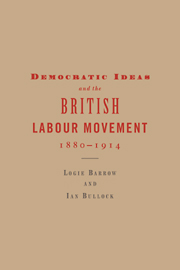Book contents
4 - Conflicts in the ILP
Published online by Cambridge University Press: 09 November 2009
Summary
The Independent Labour Party (ILP) was founded in Bradford in January 1893. A growing sense of commitment to a sometimes vague but always intensely experienced socialism, among growing numbers of trade union activists and middle-class converts alike, had combined with the experience of ‘new unionist’ successes and failures during the previous few years. Liberalism seemed bankrupt and perhaps doomed to disintegration; and the hostility of so many Liberal employers and local authorities to working class demands had eroded support among trade unionists.
As we have seen, there was already tension among socialists between, on the one hand, ‘realists’, who expected to attain short-term goals both via electoral politics at every level and via pragmatic trade union action, and, on the other hand, ‘idealists’ for whom compromise threatened the ultimate socialist goal. The ILP's disappointing performance in the 1895 election, increased the appeal of Keir Hardie's ’Labour alliance’, whereby socialist weakness would be bolstered by trade union funds and organisation. But for others the same disappointments reinforced the need for a more radical approach. The pattern remains familiar today. What was different about the 1890s is that the major issues that divided the movement were, explicitly and directly, about democracy.
In part, the clash took the form of struggles over the running of the new party. Keir Hardie's Labour Leader, launched in March 1894, acted, in practice, as the organ of the ILP's ’establishment’ with a Fabian-like attitude to democracy.
- Type
- Chapter
- Information
- Publisher: Cambridge University PressPrint publication year: 1996



